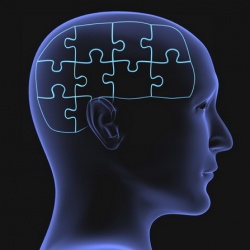Egolessness
In psychology, egolessness is an emotional state where one feels no ego (or self); of having no distinct being apart from the world around oneself. From the view of Western psychoanalysis and therapy, the state of "oneness" can be either positive or negative depending on the person, and in the context in which these feelings occur in each person. egolessness (dag me): Also called selflessness. There are two kinds: the egolessness of other or emptiness of external phenomena and the egolessness of self or the emptiness of a personal self.
The described feeling of oneness (of being inextricably woven to the fabric of one's surroundings or environment) is thought to be akin to egolessness. Lifestyles of communal ownership (no individual property) and the "vow of poverty" in many monastic traditions may also be intended to make selflessness easier to maintain; that its practitioners may continuously remain in a meditative state of mind.
In some forms of meditation in Asian religions, egolessness is a mental state that is sought after. While at the basic levels, meditation is geared toward relaxation, the practice of advanced meditators may be aimed toward the purpose of dividing one from their awareness of "self," to a certain degree, and for a certain time. The ritual and religious treatment of meditation functions so that the individual learns to take the practice with seriousness; learning to gradually control their degree of relaxation such that undesired and harmful schisms do not occur to the psyche.
Note that the term "selflessness" is similar in literal meaning (ego is the Latin word for "I") but differs in nuance and usage. One would describe a set of acts as "selfless" (altruistic) when they are not selfish—when they benefit others more than oneself. One would say that a person is "egoless" when he or she feels or acts in a way that suggests that the self is irrelevant (regardless of whether the act or attitude had any benefit to self or others). In other words, "selfless" is the opposite of "selfish" while "egoless" is orthogonal to both. The closest antonyms to "egolessness" are "egotism" (a heightened sense of self-worth or one's own importance) or possibly solipsism.
The writer Aleister Crowley distinguished between two main types of egolessness, for which he used the Sanskrit terms Dhyana (which means "meditation") and Samadhi (which he associated with the Nothing, or in Hebrew Ain). He wrote the following about the relative difficulties of attaining them:
Now we do know this, that if thought is kept single and steady, Dhyana results. We do not know whether an intensification of this is sufficient to cause Samadhi, or whether some other circumstances are required. One is science, the other empiricism.
Despite this, Crowley recommended a complex system of practices from Eastern and Western sources to help people attain Samadhi.
Ego loss is commonly experienced by those under the influence of psychedelic drugs.
Source
egolessness: "...training yourself to be a warrior is learning to rest in basic goodness, to rest in a state of complete simplicity...that state of being is called egolessness. Egolessness is very important to the Shambhala Teachings. It is impossible to be a warrior unless you have experienced egolessness. Without egolessness, your mind will be filled with yourself, your personal projects and schemes. Instead of concern for others, you become preoccupied with your own 'egofullness,' The colloquial expression of someone who is "full of himself" refers to this kind of arrogance and false pride." Egolessness is "resting in basic goodness, resting in a complete state of simplicity", the truth of non-reference point"..."The fruition of the warrior's path is the experience to primordial goodness, or the complete, unconditioned nature of basic goodness. This experience is the some as the complete realization of egolessness, or the truth of non-reference point.
" non-reference point: "The discovery of non-reference point, however, comes only from working with the reference points that exist in your life. By reference points here, we simply mean all of the conditions and situations that are part of your journey through life: washing your clothes, eating breakfast, lunch and dinner, paying bills. ...you have reference points that are connected with how you express your emotions." (pg 154) "The principles of warriorship are concerned...with learning to appreciate...those mundane reference points. But then, by relating with the ordinary conditions of your life you might make a shocking discovery...while doing any little ordinary thing, that reference point might bring an experience of non-reference point...When you put on your make up, you might discover that you are putting cosmetics on space. You are beautifying space, pure nothingness." "The warrior, fundamentally, is someone who is not afraid of space."(pg 155) "The setting sun world is afraid of space, afraid of the truth of non-reference point. In that world, people are afraid to be vulnerable. They are afraid to expose their flesh, bone, and marrow to the world outside. They are afraid to transcend the conditions or reference points they have set up for themselves. In the setting-sun world, people believe, absolutely, in their reference points...But what are they protecting themselves from? Space."
